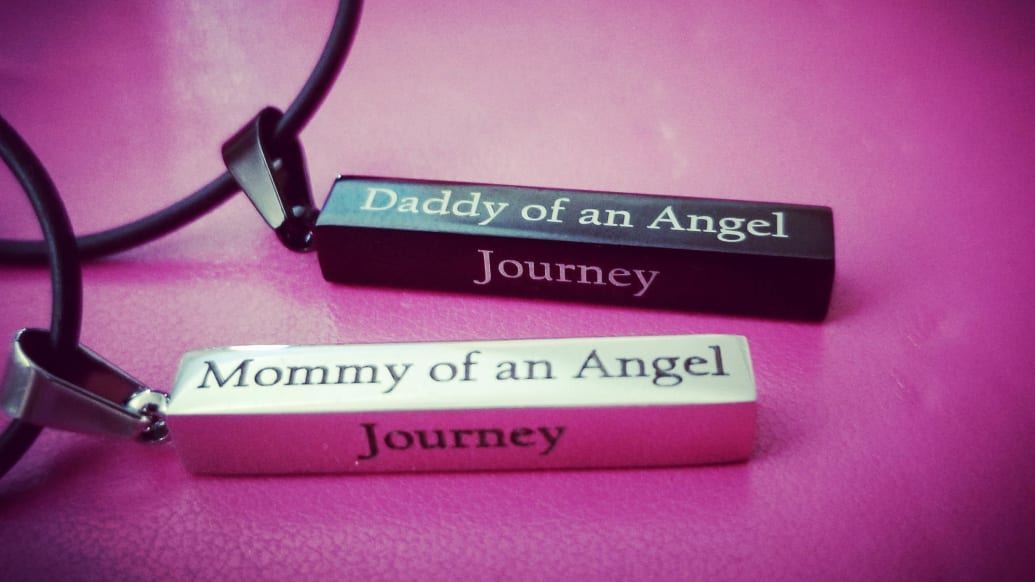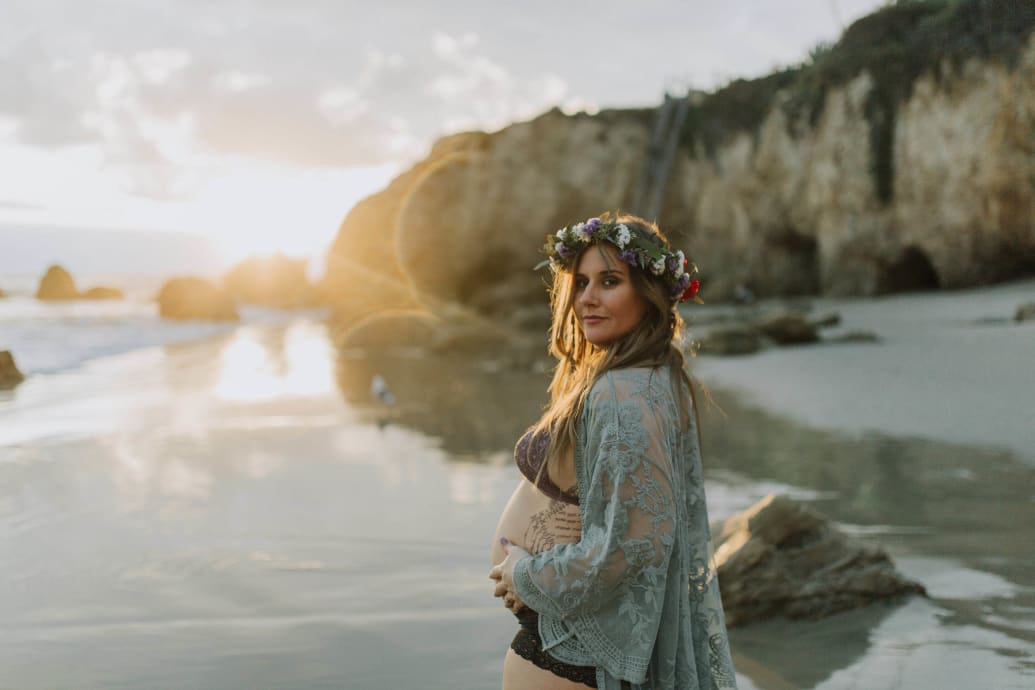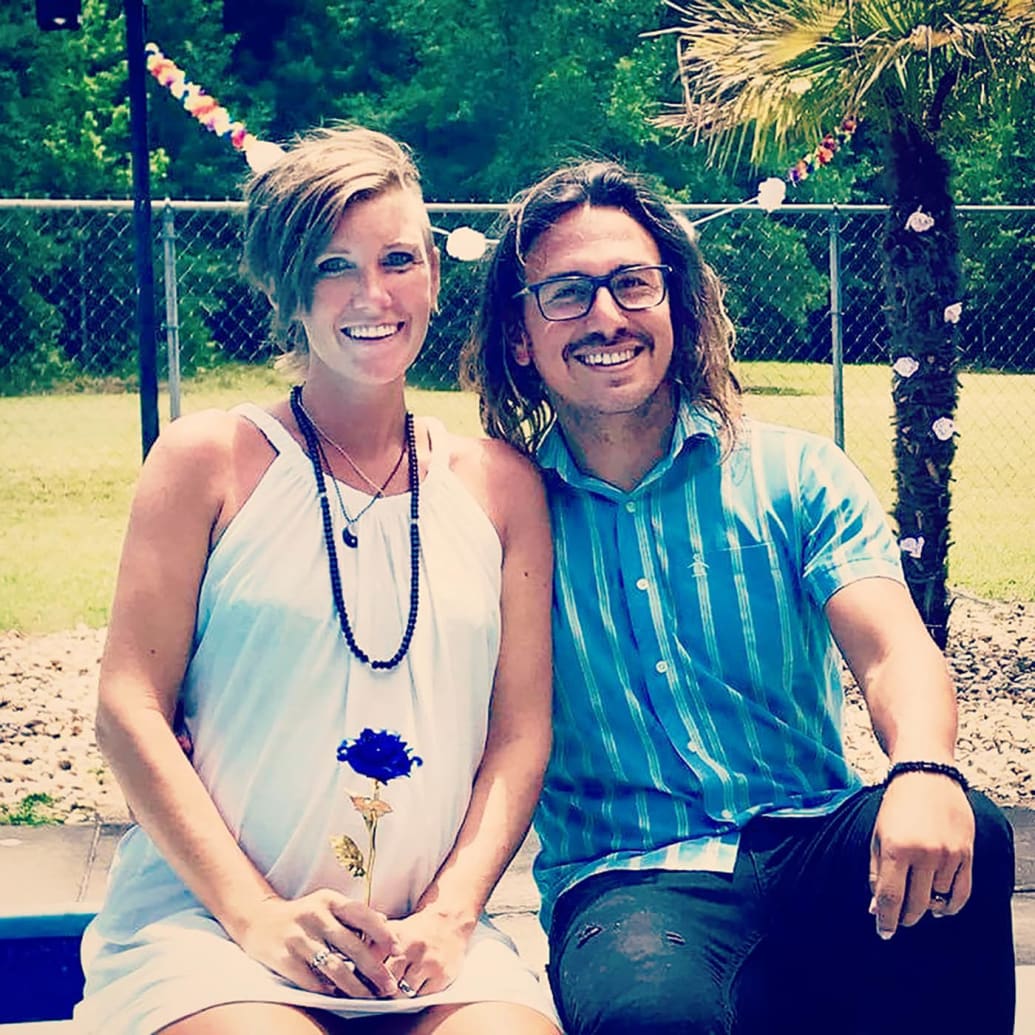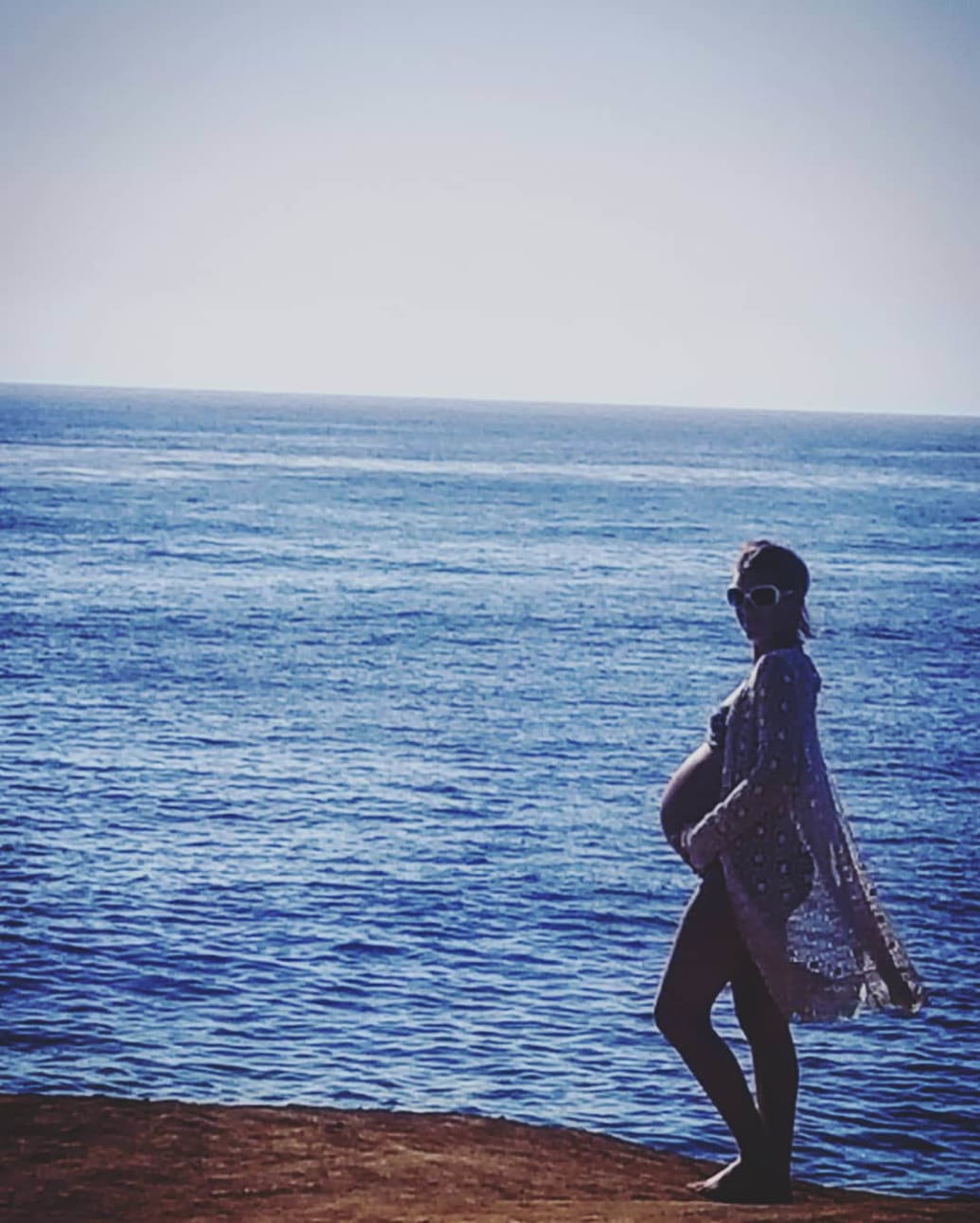In the photos, Journey Moon looks peaceful. Her eyes are closed, her tiny body swaddled in blankets. She rests on her mother's chest, the slight bruising around her face the only indication of what happened: that she was born dead, at 42 weeks, after six days of painful labor.
This was no ordinary stillbirth. Journey Moon’s mother, Lisa*, spent those six excruciating days in a remote desert home, laboring alone—aside from her husband and the virtual company of more than 6,000 members of a private Facebook group.
Lisa was a member of the now-defunct Free Birth Society, an online community for women who insist on having their babies outside the hospital, with no medical intervention. Like other members, Lisa had pledged to have her baby without the help of a doctor, doula, or midwife.
And like many members, Lisa kept the group updated throughout her labor. In posts on the private group wall, she walked them through her contractions and dilation, her pain and her moments of doubt. The members responded with messages of support, calling her a “warrior woman” and urging her to “trust the process.” After three days of this, Lisa went silent.
Then, on Oct. 8, she posted a final update.
“Journey Moon was born a sleeping angel on Oct. 7 at 8 lbs 13 oz,” she wrote. “She passed due to a massive urinary tract infection I had… I’m laying in the hospital writing this and get to go home tomorrow. We will be having Journey cremated.”
Most of the group members were supportive of Lisa. But others, including skeptics monitoring the page, were outraged that Lisa had put her baby’s life at risk for a “misguided” movement. What happened next shed light not only on the freebirthers, but on a group of outsiders set on stopping them.

Lisa and her husband marked Journey Moon's death with these pendants.
Freebirth, or home birth without assistance, is a still-rare but increasingly popular practice in the U.S. Thanks in large part to social media, the phenomenon has gone from a back-of-the-cab accident to a conscious lifestyle choice. In blog posts and viral videos, its adherents extoll the benefits of birthing at home or even in the wild. There are entire podcasts dedicated to freebirthing, with women discussing the “ecstatic” experience of giving birth in a snowed-in yurt or on a remote Hawaiian island.
Freebirthers see childbirth as a miracle, not a medical emergency. To them, labor does not involve contractions but “waves” or “surges,” and doctors don’t deliver babies—women give birth to them.
The movement is rooted in a dissatisfaction with the current obstetrical model: Freebirthers want to know why so many women come back from the hospital feeling more broken than when they went in. They note that 30 percent of mothers in the U.S. have cesarean sections, and thousands more get unwanted episiotomies. They contend that nearly 60 percent of birth attendants and educators have seen a doctor perform some kind of procedure “explicitly against the wishes of the woman.”
On a recent podcast, women's rights attorney Hermine Hayes-Klein wondered aloud whether women could truly be said to have rights when “nobody around you knows about your right, respects your right, and when there’s no accountability for the violation of your right.”
“That is the situation in which women are giving birth in the United States,” she added.
But there are other statistics to consider.
Bruce Young, a professor of obstetrics and gynecology at the NYU School of Medicine, said the average woman could expect a home birth to go smoothly about 80 percent of the time. The other 20 percent would likely involve life-threatening complications for the mother or child.
In a hospital, Young said, the risk of adverse outcomes drops to less than 1 percent—though it depends on how you define the term.
“If you define the adverse outcome as having a dead baby or a dead mom, then [the risk is] much less than 1 percent,” he said. “But if you define it as having a cesarean birth, it’s 20 to 25 percent, so that’s the trade-off.”
“I’d rather have a living baby and a cesarean birth than have a dead baby or be dead myself,” he added.
Despite the risk, a growing number of women are deciding to go it alone. And some of them, “alone” means armed with the support of thousands of other women, in Facebook communities like the Free Birth Society.
Run by Emilee Saldaya—a former home-birth midwife's assistant turned “radical birthkeeping” coach—the Free Birth Society was the largest unassisted-birth page on Facebook before it closed down. Its 6,200 members ran the gamut from crystal-toting Goop readers to blue-collar women who had experienced trauma in past hospital births.

Courtesy Cadencia Photography
Members rejoiced in each other’s pregnancies, answered each other’s questions, and commiserated over those who didn’t understand their choice. They also subscribed to a strict code of conduct: Comments encouraging other members to seek treatment, or questioning a women’s autonomy in any way, would quickly be deleted.
For more than a year, the Facebook group served as a kind of echo chamber for women making a decision that everyone else thought was wrong, who just wanted someone to tell them that it would all be OK.
But everything did not go OK for Lisa. The 29-year-old Californian told The Daily Beast she had lived “off the grid” with her husband for the last three years. She described herself as “free-spirited, natural, minimalistic, and health-conscious,” and said she knew from the start that she wanted to have a home birth.
When she stumbled across a freebirthing page on Instagram, she said, she knew this was how she had to give birth—just her and her husband, alone in their desert home, away from “harsh hospital lighting and strangers’ gloved hands.” They felt excited and powerful, she said. They were certain it was the right thing to do.
Her irregular contractions started on Oct. 2. They continued in waves that whole night, stopping suddenly at sunrise the next day. Then, just before midnight on Oct. 4, another surge came. The contractions that time lasted through the next day, coming so frequently that she could barely breathe.
“Been in labor for days,” she posted in the Facebook group that day. “Thought I was in transition at 11:30pm but nows its 3am and it’s intensely painful...like I just want to lie down and for the pain to stop for just a second.”
Saldaya reached out to her via Facebook messenger to give support, and other group members left encouraging notes in the comments. “My little one was born 4 days ago and she took over 3 days of nonstop contractions,” one wrote. “You’re a legend. It will happen.”
Three days later, Lisa’s water finally broke. She got out of bed that morning to find smelly, odd-colored liquid streaming her legs. Her stomach was aching and her bladder distended from being unable to urinate for days. At that point, despite her deepest wishes, she decided it was time to seek medical help.
Her memories from the hospital are a blur. She remembers the doctors admitting her immediately when they saw her condition. She remembers them using the doppler to check for a fetal heartbeat and finding nothing. And she remembers her husband mouthing to her, “It’s OK.”
Then she remembers pain. The doctors told her to start pushing right away, and she did—for three hours, with no progress. The doctor came back with a vacuum and ordered her to push, then called for an anesthesiologist to knock her out.
The memories become fuzzier from there, but she can still recall hearing herself screaming and not being able to stop. She remembers her husband saying the baby’s head was coming out, and then more pain. Then she blacked out.
“When I woke up I was covered in blood and so was everyone else,” she said. “And it was so quiet in there.”
After the stillbirth, Lisa kept Journey by her side for two days. She took pictures with her, talked to her, sang to her, and told her what her life would have been like. She asked her to usher in the spirits of her future siblings when the time was right. She held her in her arms with her husband, and she cried.
Then, she updated the Free Birth Society.
“Life is made up of meetings and partings; that is the way of it,” she wrote. “I am sure we shall never forget Journey Moon, or this first parting that there was among us.”
She thanked the group for letting her share her story, adding: “It felt good to write it out.”
What Lisa didn’t know was that other people were watching her. A group of concerned outsiders, worried the freebirthers were being reckless, had set up fake “sock puppet” accounts to gain entry to the private group and monitor its members. The interlopers saw themselves as sentries, keeping watch over alternative-lifestyle practitioners they believed were putting their babies in harm’s way.

After Lisa, seen here with her husband, posted about Journey Moon's stillbirth, freebirth skeptics blamed her.
The sock puppets took screenshots of Lisa’s comments and posted them in their own groups, sparking instant outcry from their followers. Some of them marvelled at why anyone would take such a risk with a pregnancy, while others blamed Saldaya for luring impressionable women into a dangerous practice.
Others were more vicious. “The twat from free birth society needs drop-kicking out of a fucking window,” one person wrote. “I wouldn’t mind seeing this monster swinging from a light post,” added another.
Still other commenters reached out to Lisa directly. On the day she came home from the hospital, she said, she received more than 30 messages from people spewing profanities or saying she should die. They posted on her Facebook wall, made “baby killer” memes, and commented on condolences left by her friends.
“What should have been a time of grieving and mourning alone with my family was now a time of defending myself from evil people and their horrible words,” Lisa told The Daily Beast in an email. “I could spend hours defending myself and family, but I feel like these are people who will never admit to being wrong. They will always fight you even dirtier than before.”
In the following days, the outcry over Lisa’s stillbirth gained traction. The lurkers brought her posts to bloggers in the pro-science community like Katie Paulson, a writer for faith-centered website Patheos. Paulson turned around nine blog posts about the incident in the span of two weeks, with headlines like, “Mother Decides to have an Unassisted Childbirth and Kills Her Baby.”
A self-described atheist and liberal, Paulson told The Daily Beast she’d dabbled in an “organic, crunchy mentality” before having her son, Von, who was born with a hormone condition called panhypopituitarism. The experience made Paulson trust more in modern medicine. As her son got sicker and she learned more about science, she said, she discovered there was “a lot of misinformation in the natural childbirth world.”
The freebirthers in particular made her angry, with their “misguided” beliefs about hospitals and “romanticized” notions of childbirth. She felt the women were putting their own birthing experience over the fate of their children.
“Childbirth as a whole is the leading cause of death for women and infants in the world,” she said. “So to have people be so cavalier about it and really thumb their nose at modern medicine, when people in developing countries would give anything to have that, it just really upset me.”
Paulson did not support the nasty attacks on Lisa and focused her online criticism on Saldaya, who she felt had manipulated her into giving birth at home. In interviews with The Daily Beast, Paulson described the Free Birth Society as “cult-like,” and insisted Saldaya had more involvement with Lisa’s stillbirth than she let on—claims both women deny.
“Emilee is just another scammer,” Paulson wrote in one article. “She provides dangerous advice to expectant mothers with the sole purpose of making money.”
Saldaya says she provided no advice to Lisa, and never even spoke to her on the phone. Nevertheless, she too received threats over social media. “You fuckin baby murderers are going down! We saw what happened, we see everything!” one person wrote to her via Instagram message. “You fucking ppl are sick!!! Eat a bullet all of you!”
The backlash prompted Saldaya to shut down the group completely. In its place, she announced the launch of a “safe and private membership platform.”
“I am so proud of the community that we have built together,” she wrote in her final post on the Facebook page. “This is not the time to run, hide or be silenced. It is a time to become more steadfast, more powerful and more protected in this radical work of healing the deepest wounds on this earth.”
The freebirth opponents saw the shutdown as a victory, if an incomplete one. Many wanted to see someone held responsible for Journey’s death, whether that was Lisa or Saldaya. Some posted that they knew where Saldaya lived and had reported her to local police and the state attorney general.
Legal experts told The Daily Beast it was unlikely she would be charged. “There should be no legal theory that should permit her to be prosecuted,” reproductive rights attorney Farah Diaz-Tello said. “It would be an unlawful attempt to criminalize her for this loss.”
In 2009, a Massachusetts woman, Allissa Pugh, was convicted of manslaughter in the death of her infant son. Pugh said her baby died during a homebirth with no medical supervision; authorities found his body in the trash. She was sentenced to two and a half years, but the state’s highest court later reversed the decision.
“Imposing a broad and ill-defined duty on all women to summon medical intervention during childbirth would trench on their ‘protected liberty interest in refusing unwanted medical treatment,’” the judges wrote.
According to Diaz-Tello, laws governing childbirth generally apply to providers, not to birthing mothers. The reasoning: Any U.S. resident has the right to refuse medical treatment, regardless of whether it is in their best interest. To prosecute a freebirthing mother, she said, the state would have to prove its own interest superseded that right.
“That would be a pretty remarkable thing to say,” Diaz-Tello said. “If you don’t go to the hospital when something’s going wrong, we’re going to what, seize your body and make you do it?”
In a 2016 statement on refusal of medically recommended treatment, the American College of Obstetricians and Gynecologists wrote: “Pregnancy is not an exception to the principle that a decisionally capable patient has the right to refuse treatment—even treatment needed to maintain life."
Diaz-Tello acknowledged that this could be difficult for some people to swallow. Even staunch feminists and abortion-rights advocates may be jarred by the idea of losing a wanted, full-term pregnancy. When that loss could be medically preventable, Diaz-Tello added, it’s easy to feel like someone got away with something.
But in Lisa’s case, she said, “This woman suffered a loss. Nobody got away with something here.”
No freebirther, Saldaya said, wants to see their baby die. The women simply believe that their offspring have a better chance of surviving—and thriving—outside the hospital than within it.
As evidence, Saldaya pointed to studies that found standard medical practices like ultrasounds do not improve pregnancy outcomes and noted that America has a higher infant mortality rate than most other developed countries.
She also armed herself with examples of mothers who she had accompanied to hospital births—mothers who were given drugs without their permission, or were subjected to vaginal exams without their consent. When she talked about them, her voice rose in anger. “You are treated like property and you are treated like a child as soon as you walk through those [hospital] doors,” she said.
Freebirth offers women a tantalizing vision: Give birth at home, surrounded by loved ones, with the freedom to move and scream and do all the other natural things that hospitals keep women from doing while a babies are tearing through them. Listen to your body, freebirthers say, and everything will be alright.
Medical professionals say that’s naive.
The American College of Obstetricians and Gynecologists declined to comment for this story, but previously recommended employing a trained professional for any birth outside a hospital. They also noted that planned home birth is “clearly associated with a higher risk of perinatal death."
The British Royal College of Midwives and Royal College of Obstetricians and Gynaecologists have both questioned freebirthing, and the Society of Obstetricians and Gynaecologists of Canada has roundly condemned it. André Lalonde, former executive vice-president of the Canadian group, called freebirthing “Russian roulette with your child.”
“You don’t play with a child’s life,” he told Maclean’s.
Some statistics bear this out: Globally, countries where women have better access to medical intervention have dramatically lower rates of maternal mortality and stillbirth than those without. While the U.S. still lags behind its peers, most developed countries have a stillbirth rate of three to five per 1,000 births, while most developing countries have a rate ten times that. The maternal mortality rate in developing countries is also higher, with 239 deaths per every 100,000 births, versus 12 per every 100,000 births in developed countries.
Confronted with arguments like this, many freebirthers argue that the statistics aren’t the point. The real question, they say, is not whether a woman should choose to birth at home, but whether she has the right to make that choice at all.
While the freebirthers’ focus on motherhood may seem old-fashioned, many in the movement consider themselves radical feminists. Hayes-Klein, the women’s rights lawyer, frequently employs familiar feminist terms like “patriarchy” when discussing freebirth, claiming male-dominated systems “keep women ignorant about their own bodies.”
Hayes-Klein said she often speaks with doctors who wonder whether a mother’s autonomy applies when the baby’s life is in danger. Her answer is always the same: “Dude, she still gets to make the decisions. Even if you think the baby’s going to die.”
And if doctors feel conflicted about that? “Get some therapy, go for a run, do what you need to do,” she said. “But forcing this woman is not a way that you get to deal with your feelings.”
That argument doesn’t sit right with Paulson. She called the freebirthers’ ideas “irrational,” and compared their situation to those struggling with addiction. “I am all about women giving women control of their bodies, but you wouldn’t just say, ‘I want to be a drug addict, let me be a drug addict,’” she said.
The troubling thing about the freebirthers, she added, is that “these women say that they care about each other, but when a woman is in an emergency situation, they won’t help her.”
If Paulson is right, and the freebirthers won’t help other women in crisis, then some of the online lurkers have decided they will.
According to Paulson’s blog, in the days following Lisa’s stillbirth, the sock puppet accounts learned of another woman attempting a freebirth in Alaska. The woman had previously posted on a different freebirth page that she planned to give birth at home, with a broken rib and pre-eclampsia. The outsiders decided they had to follow her.
In late October, the woman informed her group that she was in labor and experiencing terrible pain. She thought it had something to do with her rib because none of her other pregnancies had felt this hard. The sock puppets took screenshots of her posts, and the freebirthers’ replies, and shared them with each other in real time as the labor progressed.
When the pregnant woman went silent for hours, one of the sock puppets decided it was time to act. They researched the mother online and found her address, then called authorities to request a wellness check. Later, when the woman shared photos of herself and a healthy baby in the hospital, the sock puppets celebrated.
“We feel confident that our intervention did have an impact on the mother and the infant surviving childbirth,” Paulson wrote at the time. “Our work is not done, and we will continue to track births going sideways to ensure babies and mothers survive.”
Reached by The Daily Beast, however, the mother said she had not gone to the hospital when the police checked in on her. Instead, she transferred hours later, when the pain from labor became too much to bear.
When the officer arrived for the wellness check, she said, she was resting in her bathtub, in pain but not panicking. She was more annoyed at having to get dressed to answer the door than anything else.
“I think it’s bullshit,” the mother, Sammi Van Vleet, told The Daily Beast in a phone interview from the hospital. “Nobody should be interfering with anyone else's choices. Just because I’m pregnant doesn't take away my right to choose.”

Lisa says she is still committed to the freebirth movement.
Three weeks after her stillbirth, when the worst of the online backlash had started to dry up, Lisa echoed these thoughts.
In an email to The Daily Beast, she wrote that despite Journey Moon’s death she still believes it is a woman’s right to choose the best birthing option for her. And while she will likely have to do things “less naturally” next time, due to damage from her last labor, she isn’t turning her back on the movement.
“My body is fully capable of birth. I was created to birth. I can and will birth again,” she wrote. “I will conceive again and birth again and the outcome will be different. I believe that.”
*A pseudonym was used for Journey Moon’s mother.

